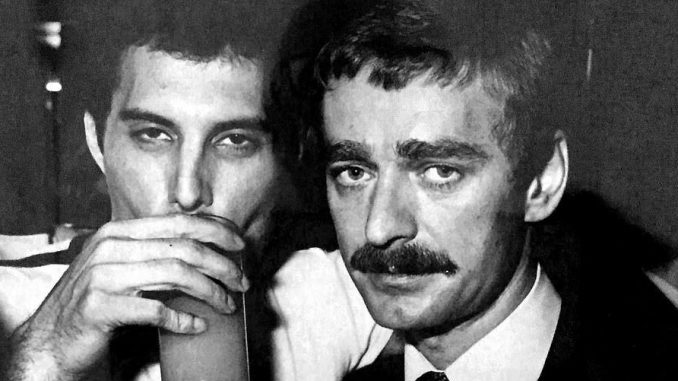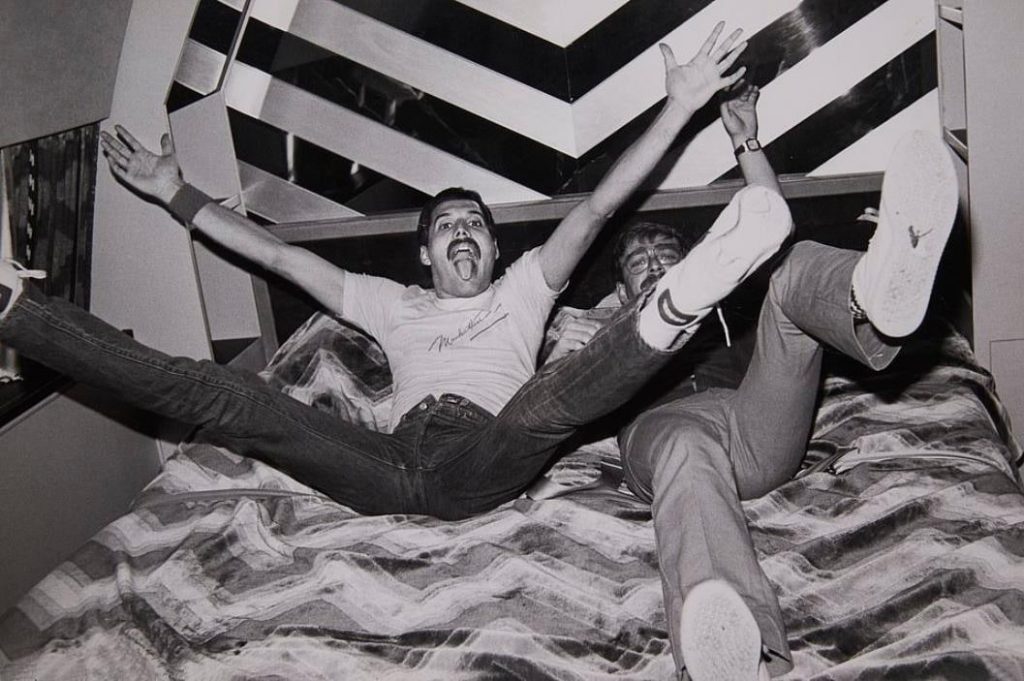
Introduction
Not much is known about Paul Prenter’s life before he went on to manage debatably one of the most famous bands of all time, Queen.
Early Life
Born in 1946 in London, England, Paul’s father and mother remain nameless. A few of Paul’s family members including his brother came forward after the movie ‘Bohemian Rhapsody’ was released to defend Pauls honour. In the movie Paul’s character is portrayed as a sly, cunning man, set on forcing his own agenda on Freddie Mercury and the other members of Queen. Prenter’s family insist that Freddie and Paul were just close friends and were not romantically involved, although Paul was openly gay from the age of 16, and his parents were supportive throughout his life.
Freddie with Paul Prenter in early 80s.
Posted by To Freddie Mercury on Sunday, July 28, 2019
They went on to say that the line in the movie where Pauls character stated ‘My father would rather see me dead’ in reference to his sexuality was extremely hurtful and very untrue. Pauls brother, close friends and goddaughter believe that the movie was ‘cowardly’, ‘untrue’ and ‘hurtful.’
Career
The only known job of Prenter’s before he became involved with Freddie Mercury was that he was a Radio DJ in Belfast, Northern Ireland. Shortly after meeting Freddie, he quit his job to work for Mercury as his personal assistant, before going on the manage Queen after their existing manager was fired. His role was to book gigs, organise concerts and be the general liaison for the band. However much to the (apparent) dismay of Queens other members, Brian May, John Deacon and Roger Taylor, Paul and Freddie grew extremely close.
The other members of the band started to doubt Prenter’s intentions were pure, and when Queens album ‘Hot Space’ was released in 1982, the relationship between the band and their manager quickly became more tense. The album was not at all successful and Prenter was blamed for its failure. They believed that many of Prenter’s managerial decisions were not in the best interest of the band, such as denying radio promotions of the album.
Prenter was fired a year after the Live Aid concert in 1986, ending Freddie and Pauls business and personal relationship. Brian May, Queens leader, has come forward to say that ‘their manager was not all bad’ and that the media played him out to be more of a villain than he actually was.
Meeting and interaction with Freddie Mercury
Pauls relationship with Queens front man Freddie Mercury was kept under wraps for many years, until Prenter outed Freddie’s sexual preference and their relationship in a story he sold to “The Sun” magazine in 1987, while also revealing that the singer was in a relationship with a man by the name of Jim Hutton.
There are many conflicting stories on whether Paul and Freddie were in fact romantically linked – the only people who seem to adamantly deny that this was the case is Paul’s family.
The history of Freddie Mercury and Queen
Freddie – who is now known in rock music as arguably one of the greatest lead singers of all time, is most famously known for his four-octave vocal range, and his over the top stage presence – started from very humble beginnings.
Farrokh Bulsara was born on the 5th September 1946 in Zanzibar. His parents Bomi and Jer were Parsi, originally from India to where they returned while Freddie was still very young, and where most of his childhood was spent. At the age of seven he began taking piano lessons, and at the age of eight he was sent to St. Peter’s school, where after a few years he formed a school band that performed rock covers. A school friend has said that Freddie ‘had an uncanny ability to listen to the radio and replay what he has heard on the piano.’ It was around this time that Mercury started to refer to himself as ‘Freddie’; in 1964 Freddie and his family moved to Feltham, Middlesex, England.
In the April of 1970, Freddie joined drummer Roger Taylor and guitarist Brian Mays’s band Smile as the lead singer.
A year later John Deacon joined them as the base player, and despite the unsurety of the band and their production studio, Freddie changed the band’s name to ‘Queen.’ Freddie once said while referring to the band’s new name that ‘It’s very regal obviously, and it sounds splendid. It’s a strong name, very universal and immediate. I was certainly aware of the gay connotation, but that was just one facet of it.’ It was soon after this that Freddie made the legal change of his surname from Bulsara to Mercury.
Some of Queens greatest hits were “Bohemian Rhapsody”, “Killer Queen”, “We are the Champions”, “Somebody to Love”, “Radio Gaga,” “Another One Bites the Dust,” “We will Rock You,” “Fat Bottomed Girls,” “Don’t Stop me Now”, and “Crazy Little Thing Called Love”. Freddie was well known for his connection with his audience, and his flamboyant stage presence, which was very apparent at the Live Aid concert in 1985.
After the breakup of Queen, Freddie lead a short solo career before dying from underlying conditions of AIDS at the age of 45 in 1991. Freddie announced the day before his death that he had been living with AIDs for the last fouryears of his life.
Subsequently in 2001 Mercury was inducted into the Rock ‘n’ Roll Hall of Fame, as well as the Songwriters Hall of Fame in 2003.
Net worth, salary, significant inputs
There are no published sources that state Pauls possible net worth, but after he was fired in 1987 he sold a story to ‘The Sun’ for which he was famously paid £32,000, releasing intimate details of Freddie’s life and the time that he had spent managing Queen.
Just some of the claims said that two of Mercury’s lovers had lost their lives to AIDS, and that he had had many more lovers, possibly in hundreds.

Paul said that being the manager of Queen for a decade was anything but smooth sailing, and was four times longer than any other manager had lasted with the band. Prenter said that ‘The first three or four years were very good, but when they started to make money, the last six were unadulterated misery.’ He also went on to say that ‘They are four very demanding, single minded, unreasonable and ungrateful individuals. Their prime motive at any time is another hit single, and nothing is allowed to get in the way. It was fun to begin with, but it became a real drag. It was like looking after four children, four spoiled brats. I was pleased to be away from them and if I never saw them again it would be too soon.’ ‘What would bother me would be when I would organise and interview for Freddie and he wouldn’t show up.
In one case I had to lie and tell Simon Bates the Freddie was ill. Paul returned to Belfast after selling the story, but after he spent all the money that he had received for selling out Freddie, it was rumoured that he crawled back to Mercury to ask him for more cash.
Eventually complications of smoking related to AIDS took Pauls life in Belfast in 1991, the same year Freddie’s life was taken by the same disease.
Physical characteristics
Prenter stood at 5ft 6ins (1.67m) tall and weighed about 132 lbs (60kgs). Prenter had blonde hair, blue eyes, body measurements of 38-28-35, and biceps with a circumference of 13.5 inches.
Leave a Reply